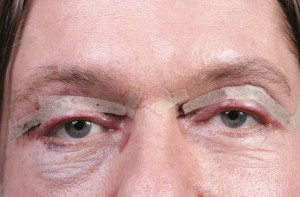
When cosmetic (or plastic) surgery goes wrong, the emotional consequences can be disastrous. Patients may feel embarrassed to talk about it, feel guilty or helpless. At the beginning of September you may have heard about a tragic incident in Russia in which a man in his 30s unhappy with the outcomes of his cosmetic surgery shot a doctor and then shot himself. You can read about the incident in the Telegraph.
In this tragic case it is evident that the patient was distressed and believed there was no better way of handling the situation. Some consider that the trigger to anger the patient was an advice from the doctor to seek professional psychological help.
Robert Barker, Partner at M R Law, has specialised in personal injury and medical negligence for over 20 years. According to him, such clients are understandably emotionally distressed and feel incredibly let down by their surgeon or service provider. “Their decision to have cosmetic surgery in the first instance was already a difficult one,” Barker notes. “They may have had confidence issues, been self-conscious or gone through emotionally difficult times. When the surgery goes wrong, patients’ psychological state inevitability worsens and in many cases affects their ability to work or lead a normal life.” Decision of medical negligence clients to seek legal advice may be a difficult one as they come to terms with the fact they will now need to highlight a part of their body they are unhappy with and which will become the subject of scrutiny, being the opposite of what they had hoped to achieve through surgery.
Cosmetic Surgery Industry
Based on the British Association of Aesthetic Plastic Surgeons data, over 45,000 Britons underwent cosmetic surgeries in 2014. The most popular surgical procedures were breast augmentation (boob job) (19%), blepharoplasty (eyelids) (17%), face and neck lift (14%), breast reduction (12%) and liposuction (fat removal) (10%). Women accounted for 91% of these procedures.

Cosmetic surgery patients believe that surgical procedures will change their lives for better and will improve their wellbeing. Although in the majority of cases surgical procedures have positive effects on the emotional state of patients, the impact of clinical errors on their lives may be devastating.
When the PIP implant scandal started to unfold a great number of women had to go through a stressful period before their surgeons confirmed if their implants were or were not manufactured by Poly Implant Prothese. Around 47,000 women in Britain were given substandard PIP breast implants made of industrial silicone rather than medical-grade. While some women have undergone surgeries to remove their PIP implants, many are still living with them as they do not have funds to have another surgery to replace the implants.
Before surgery: if you are considering
All cosmetic surgery carries risk and problems can occur on some occasions. Before choosing a clinic for your surgery, conduct thorough research, check qualifications of your doctors and most importantly read the consent form that details all potential risks associated with your surgery. Your surgeon should counsel you to understand whether you are fit for the surgery and advise you what you should expect.
“Patients must be offered counselling and a two-week cooling off period before undergoing treatment,” comments Barker. “The Care Standards Act 2002 introduced minimum standards to regulate private clinics and to ensure all practitioners were appropriately recruited, trained and qualified,” he adds.
After surgery: if you are unhappy
Up to 20% of cosmetic surgery patients are reported to have complained that their surgery has gone wrong. In some cases it is a matter of time and waiting until you are healed to see the final results of the surgery. Your surgeon should explain the healing process and give advice on aftercare to help avoid this stress.
However, if the healing process takes longer than expected or the final result falls below your expectations, in the first instance your complaint should be directed to the clinic with whom you had the contract and to whom you paid for the surgery, which may or may not actually be where the procedure was performed. Your clinic may agree to give you a refund or perform corrective surgery.
If your surgeon does not agree that there was negligence from their side, you could visit another consultant for an independent opinion. An independent consultant will provide their views on the standard of the treatment received and confirm if your surgeon has done something no reasonably competent practitioner would have done.
Barker notes that whereas corrective treatment can be performed, not all hospitals agree to do it or clients may not have money for it. “Quite often our clients seek compensation to pay for the corrective treatment,” he explains.
Quite often our clients seek compensation to pay for the corrective treatment. ~Robert Barker
Establishing medical negligence (clinical error)
It takes a lot of courage to accept the fact that the surgery you were considering as an investment in your wellbeing turned out to do the opposite. You may feel guilty for not doing enough research or think that you cannot prove that a medical error occurred. Remember that you have the right to receive services performed with reasonable care and skill as outlined by the Consumer Rights Act 2015.
To start with establishing if your treatment was not adequate, consider if one of the below took place:
- Another medical expert confirmed that the work was not carried out with reasonable care and skill
- Your consultant did not provide you with sufficient information about risks associated with your surgical procedure
- The cosmetic procedure was not performed to the expected healthcare standard
- Aftercare was below standard or not provided
- A defective product was used during your surgery that poses risks to your health or caused an injury
If you are still unsure or if you believe that you have a medical negligence case and want compensation, you should speak to a medical or clinical negligence solicitor. The best way to find a qualified solicitor is through recommendations from other people in your situation or from a member list of specialist medical or clinical negligence solicitors on the Law Society’s website. When choosing a solicitor, make sure you understand fees and success rate for their representation. A good solicitor is honest and upfront about what it will cost to you.
You can look at our medical negligence infographic to understand what to expect once you contact a solicitor or alternatively watch this video.
About M R Law Solicitors
M R Law are specialist medical negligence solicitors; you can contact us directly to discuss your case if you feel you were mistreated. Our firm does not directly charge you for advice or representation as our fees are usually recovered from the other party in successful cases. Our success rate on medical negligence cases is 98%.

Leave a comment